必修2 Unit 1 Cultural relics Grammar 限制性和非限制性定语从句(课件39幻灯片)
文档属性
| 名称 | 必修2 Unit 1 Cultural relics Grammar 限制性和非限制性定语从句(课件39幻灯片) | 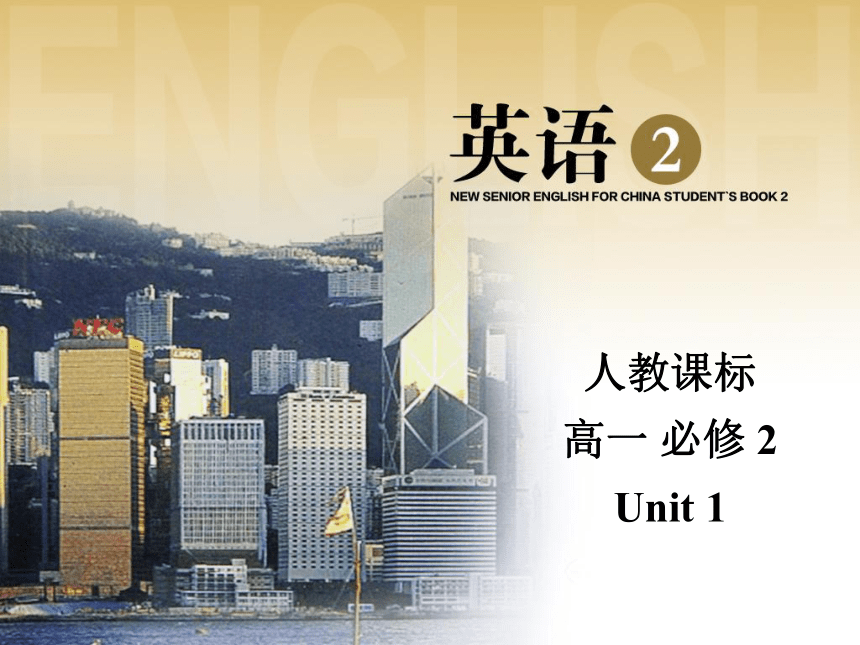 | |
| 格式 | zip | ||
| 文件大小 | 5.2MB | ||
| 资源类型 | 教案 | ||
| 版本资源 | 人教版(新课程标准) | ||
| 科目 | 英语 | ||
| 更新时间 | 2015-11-27 21:43:44 | ||
图片预览

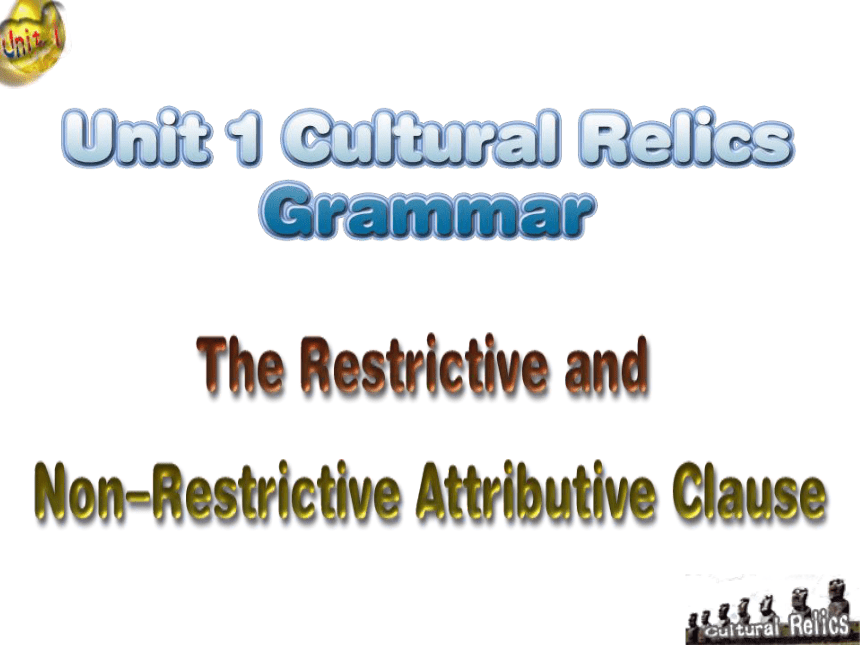
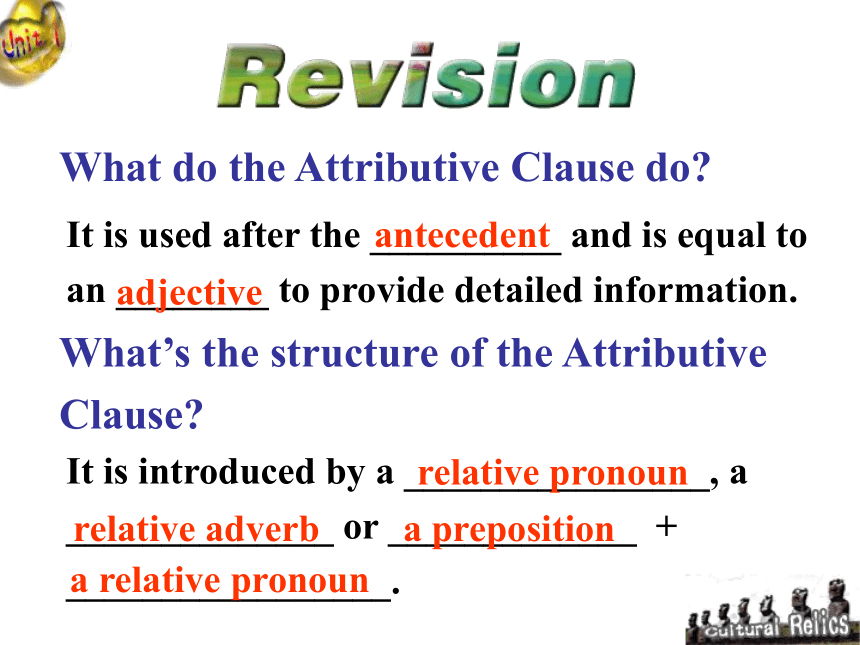
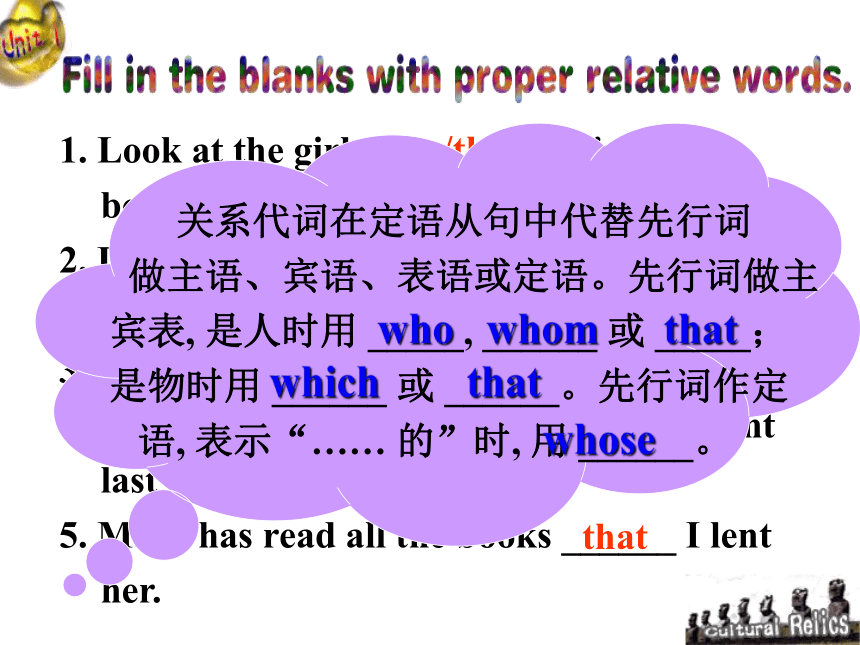
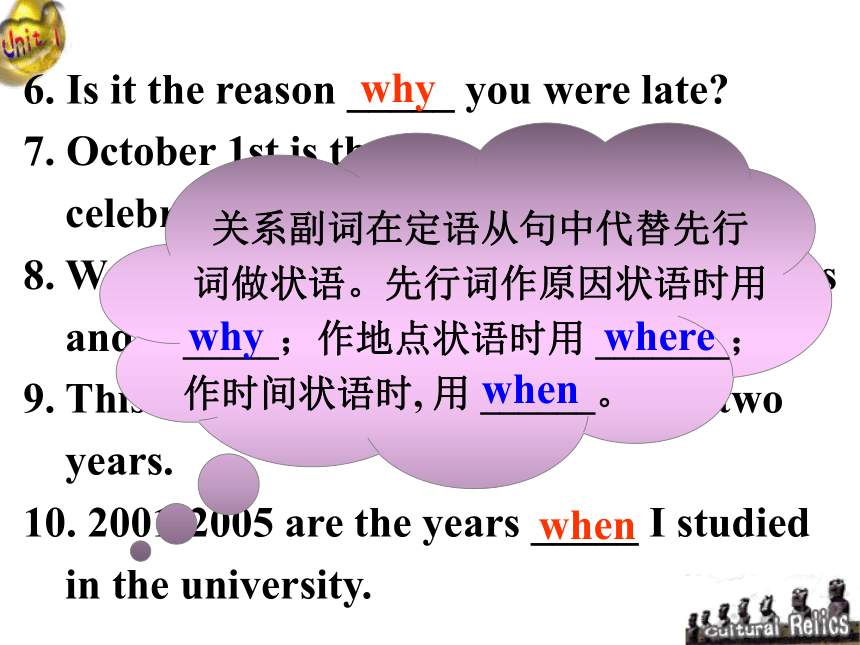
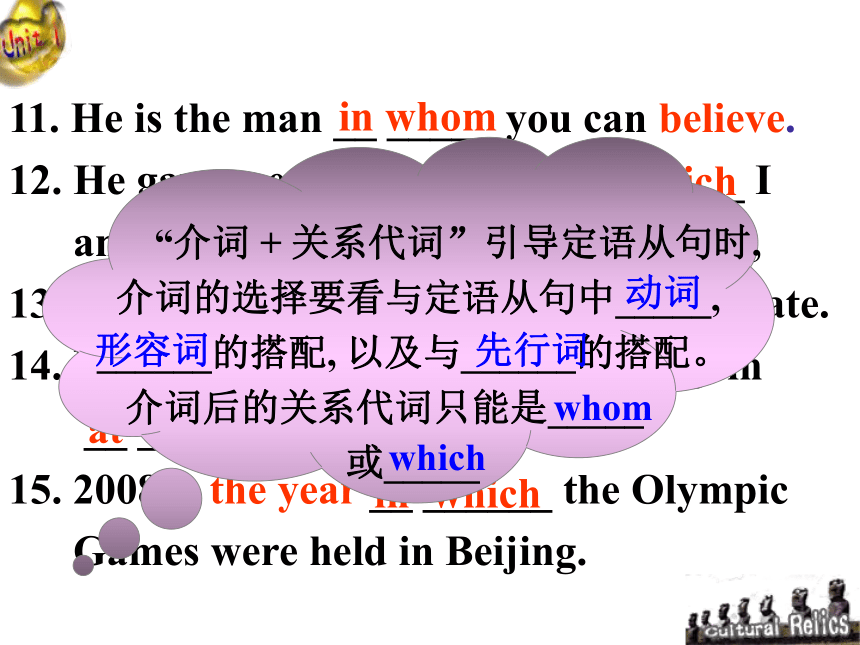
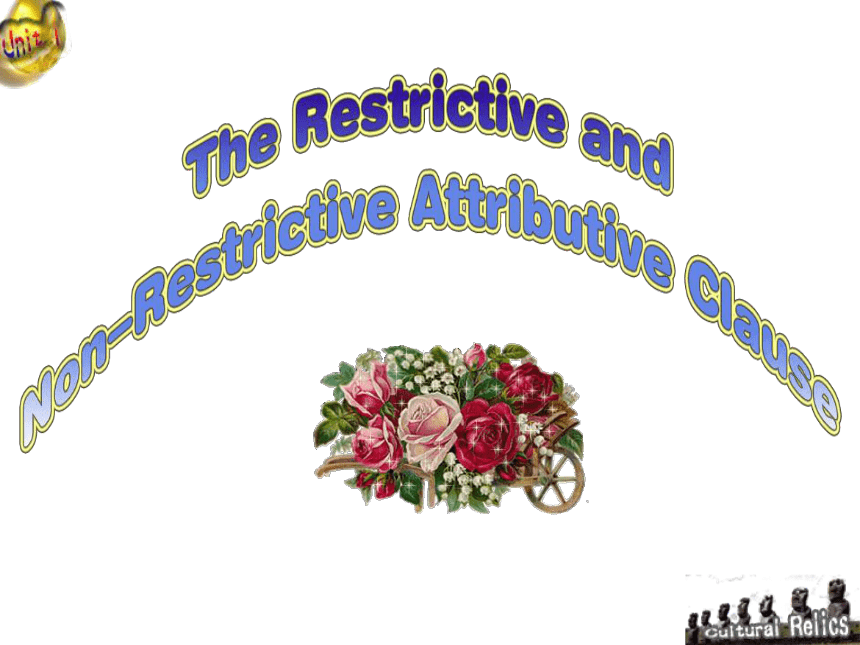
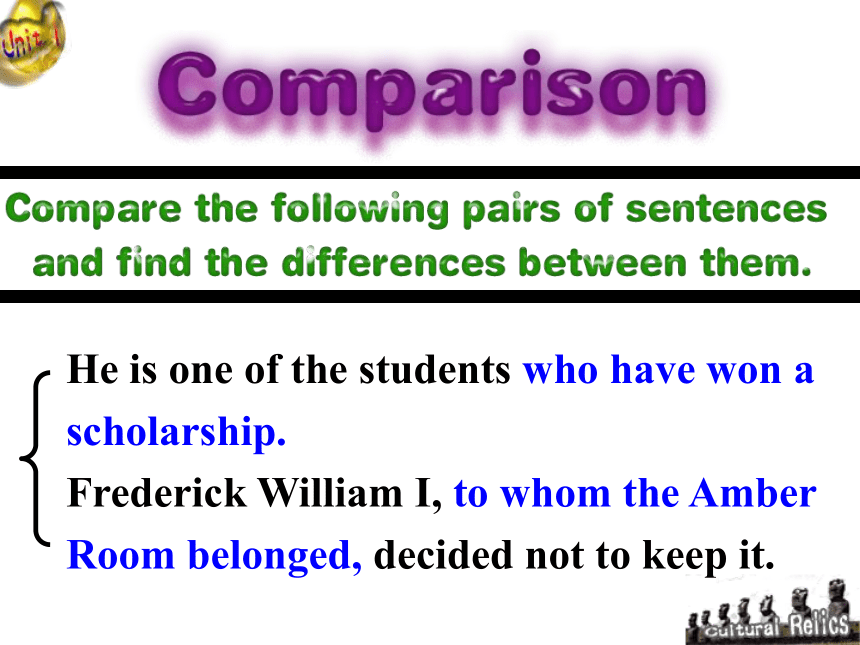
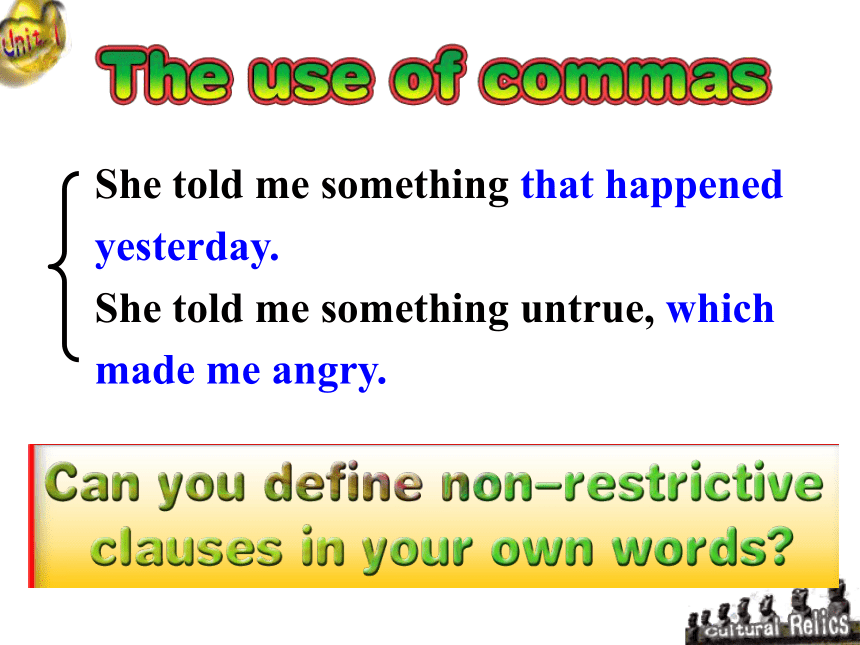
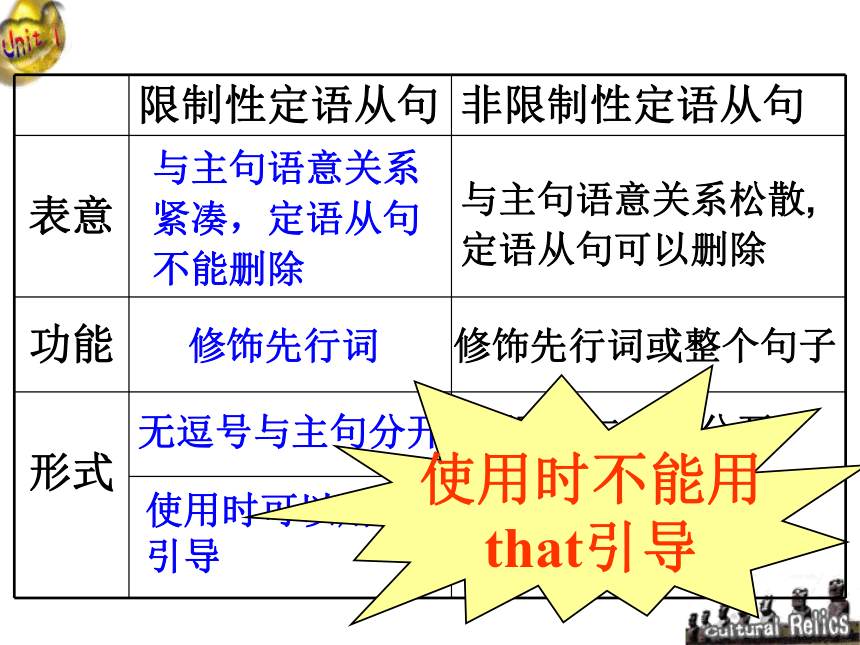
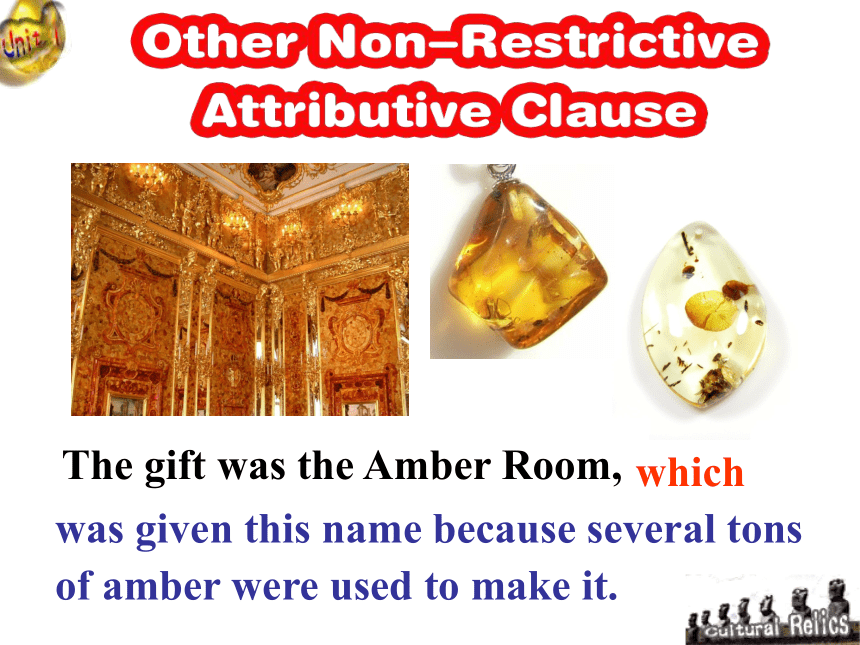
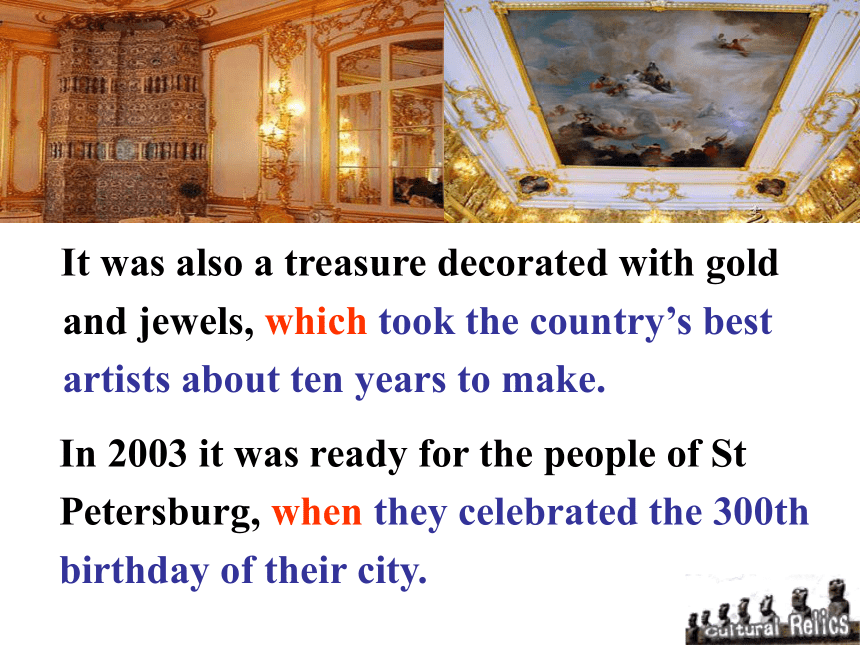
文档简介
课件39张PPT。人教课标
高一 必修 2
Unit 1What do the Attributive Clause do?
What’s the structure of the Attributive Clause?It is used after the __________ and is equal to an ________ to provide detailed information.It is introduced by a ________________, a ______________ or _____________ +
_________________.antecedentrelative pronounrelative adverba prepositiona relative pronounadjective1. Look at the girl _________ is singing so beautifully.
2. Do you know the woman to ______ our teacher is talking?
3. Jim is the boy ______ hat is red.
4. He gave me a pen ___________ he bought last week.
5. Mary has read all the books ______ I lent her.who/thatwhomwhosethat / whichthat 关系代词在定语从句中代替先行词
做主语、宾语、表语或定语。先行词做主
宾表, 是人时用 _____, ______ 或 _____;
是物时用 ______ 或 ______。先行词作定
语, 表示“…… 的”时, 用 ______。 who whom that which that whose6. Is it the reason _____ you were late?
7. October 1st is the date _____ China celebrates its National Day.
8. We walked in a garden ______ many trees and flowers had been planted.
9. This is the island ______ I lived for two years.
10. 2001-2005 are the years _____ I studied in the university.whywhenwherewherewhen 关系副词在定语从句中代替先行
词做状语。先行词作原因状语时用
_____;作地点状语时用 _______;
作时间状语时, 用 ______。whywherewhen11. He is the man __ _____ you can believe.
12. He gave me some books ____ ______ I
am not very familiar.
13. This is the reason ___ ______ he was late.
14. I will never go to the restaurant again
__ ______ I was treated badly.
15. 2008 is the year __ ______ the Olympic
Games were held in Beijing.in whomwith whichfor whichat whichin which “介词 + 关系代词”引导定语从句时,
介词的选择要看与定语从句中_____,
______的搭配, 以及与______的搭配。
介词后的关系代词只能是_____
或_____先行词动词形容词whomwhichHe is one of the students who have won a scholarship.
Frederick William I, to whom the Amber Room belonged, decided not to keep it.She told me something that happened yesterday.
She told me something untrue, which made me angry.修饰先行词修饰先行词或整个句子无逗号与主句分开有逗号与主句分开使用时可以用that
引导与主句语意关系紧凑,定语从句不能删除与主句语意关系松散,定语从句可以删除使用时不能用that引导 The gift was the Amber Room, which was given this name because several tons of amber were used to make it. It was also a treasure decorated with gold and jewels, which took the country’s best artists about ten years to make.In 2003 it was ready for the people of St Petersburg, when they celebrated the 300th birthday of their city. Here are the farmers who discovered the
underground city last month. They discovered the underground city last month. Here are the farmers.Many people come to buy tea in that city.Hangzhou is a famous city in China.Hangzhou is a famous city in China, where
many people come to buy tea.I don’t know the reason why she got
so angry. I don’t know the reason.She got so angry. You are talking to the old man who saw
some Germans taking apart the Amber
Room and removing it. The old man saw some
Germans taking apart the Amber Room and removing it.You are talking to an
old man.take a mouse apartI can’t tell the twins apart.The two cities are 800 miles apart. The woman remembered the day when
she saw Nazis burying something near
her home. The woman remembered the day. She saw Nazis burying something near her home. St Petersburg is a very beautiful city, which
was once called Leningrad.It was once called
Leningrad.St Petersburg is a
very beautiful city.I remember the soldier. I remember the soldier who told me not
to tell anyone what I had seen. He told me not to tell
anyone what I had seen. The soldiers moved the boxes to a mine.The soldiers moved the boxes to a mine,
where they wanted to hide them.They wanted to hide them.Xi’an is one of the few cities with city walls. Xi’an is one of the few cities whose city
walls remain as good as before.Its walls remain as good as before. Shaanxi Province is a place with many cultural relics. Shaanxi Province is a place where cultural
relics are well looked after.They are well looked
after. He gave me a pen he bought yesterday.
He gave me a pen, which he bought just now. 关系代词在限制性定语从句中作宾语
时可以省略。
关系代词在非限制性定语从句中不可以
省略。1. A middle-aged woman killed her husband, which frightened me very much.
2. A five-year-old boy can speak two foreign languages, which surprises all of us.大多数定语从句的先行词往往为某一个词或短语, 而有时非限制性定语从句的先行词也可为整个主句, 此时非限制性定语从句常由 _____ 引导。which She has married again, which delighted us.
Spiders are not insects, as many people think.
As you will find out, I will never let you down.as (译为 __________) 引导的非限制性定语从句的位置比较灵活, 可位于所修饰的句子之后, 句中或句首; 而由 which (译为 ________________) 引导的非限制性定语从句一般不位于句首。 “正如……”“这” 或 “这件事”This is the girl whom/who I met in the street.
A young man had a new girl friend, whom he wanted to impress.关系代词whom在限制性定语从句中作宾语时可用who代替,但在非限制性定语从句中作宾语时不可用who来代替。1. The prize will go to the
writer _______ story shows the most
imagination.
A. that B. which C. whose D. what
2. Ted came for the weekend wearing only
some shorts and a T-shirt, ____ is a
stupid thing to do in such weather.
A. this B. that C. what D. which3. Mary was much kinder to Jack than
she was to the others, ____, of course,
make all the others upset.
A. who B. which C. what D. that
4. You’ll find taxis waiting at the bus
station ____ you can hire to reach your
host family.
A. which B. where C. when D. as5. The old town has narrow streets and small houses _____ are built close to each other.
A. they B. where C. what D. that
6. She showed the visitors around the museum, the construction _____ had taken more than three years.
A. for which B. with which
C. of which D. to which7. Between the two parts of the concert is an interval, _______ the audience can buy ice-cream.
A. when B. where C. that D. which
8. Whatever is left over may be put into the refrigerator, _____ it will keep for two or three weeks.
A. when B. which C. where D. while9. English is a language shared by several
diverse cultures, each of ____ uses it
somewhat differently.
A. which B. what C. them D. those
10. A bank is the place ______ they lend
you an umbrella in fair weather and
ask for it back when it begins to rain.
A. when B. that C. where D. thereThank you!
高一 必修 2
Unit 1What do the Attributive Clause do?
What’s the structure of the Attributive Clause?It is used after the __________ and is equal to an ________ to provide detailed information.It is introduced by a ________________, a ______________ or _____________ +
_________________.antecedentrelative pronounrelative adverba prepositiona relative pronounadjective1. Look at the girl _________ is singing so beautifully.
2. Do you know the woman to ______ our teacher is talking?
3. Jim is the boy ______ hat is red.
4. He gave me a pen ___________ he bought last week.
5. Mary has read all the books ______ I lent her.who/thatwhomwhosethat / whichthat 关系代词在定语从句中代替先行词
做主语、宾语、表语或定语。先行词做主
宾表, 是人时用 _____, ______ 或 _____;
是物时用 ______ 或 ______。先行词作定
语, 表示“…… 的”时, 用 ______。 who whom that which that whose6. Is it the reason _____ you were late?
7. October 1st is the date _____ China celebrates its National Day.
8. We walked in a garden ______ many trees and flowers had been planted.
9. This is the island ______ I lived for two years.
10. 2001-2005 are the years _____ I studied in the university.whywhenwherewherewhen 关系副词在定语从句中代替先行
词做状语。先行词作原因状语时用
_____;作地点状语时用 _______;
作时间状语时, 用 ______。whywherewhen11. He is the man __ _____ you can believe.
12. He gave me some books ____ ______ I
am not very familiar.
13. This is the reason ___ ______ he was late.
14. I will never go to the restaurant again
__ ______ I was treated badly.
15. 2008 is the year __ ______ the Olympic
Games were held in Beijing.in whomwith whichfor whichat whichin which “介词 + 关系代词”引导定语从句时,
介词的选择要看与定语从句中_____,
______的搭配, 以及与______的搭配。
介词后的关系代词只能是_____
或_____先行词动词形容词whomwhichHe is one of the students who have won a scholarship.
Frederick William I, to whom the Amber Room belonged, decided not to keep it.She told me something that happened yesterday.
She told me something untrue, which made me angry.修饰先行词修饰先行词或整个句子无逗号与主句分开有逗号与主句分开使用时可以用that
引导与主句语意关系紧凑,定语从句不能删除与主句语意关系松散,定语从句可以删除使用时不能用that引导 The gift was the Amber Room, which was given this name because several tons of amber were used to make it. It was also a treasure decorated with gold and jewels, which took the country’s best artists about ten years to make.In 2003 it was ready for the people of St Petersburg, when they celebrated the 300th birthday of their city. Here are the farmers who discovered the
underground city last month. They discovered the underground city last month. Here are the farmers.Many people come to buy tea in that city.Hangzhou is a famous city in China.Hangzhou is a famous city in China, where
many people come to buy tea.I don’t know the reason why she got
so angry. I don’t know the reason.She got so angry. You are talking to the old man who saw
some Germans taking apart the Amber
Room and removing it. The old man saw some
Germans taking apart the Amber Room and removing it.You are talking to an
old man.take a mouse apartI can’t tell the twins apart.The two cities are 800 miles apart. The woman remembered the day when
she saw Nazis burying something near
her home. The woman remembered the day. She saw Nazis burying something near her home. St Petersburg is a very beautiful city, which
was once called Leningrad.It was once called
Leningrad.St Petersburg is a
very beautiful city.I remember the soldier. I remember the soldier who told me not
to tell anyone what I had seen. He told me not to tell
anyone what I had seen. The soldiers moved the boxes to a mine.The soldiers moved the boxes to a mine,
where they wanted to hide them.They wanted to hide them.Xi’an is one of the few cities with city walls. Xi’an is one of the few cities whose city
walls remain as good as before.Its walls remain as good as before. Shaanxi Province is a place with many cultural relics. Shaanxi Province is a place where cultural
relics are well looked after.They are well looked
after. He gave me a pen he bought yesterday.
He gave me a pen, which he bought just now. 关系代词在限制性定语从句中作宾语
时可以省略。
关系代词在非限制性定语从句中不可以
省略。1. A middle-aged woman killed her husband, which frightened me very much.
2. A five-year-old boy can speak two foreign languages, which surprises all of us.大多数定语从句的先行词往往为某一个词或短语, 而有时非限制性定语从句的先行词也可为整个主句, 此时非限制性定语从句常由 _____ 引导。which She has married again, which delighted us.
Spiders are not insects, as many people think.
As you will find out, I will never let you down.as (译为 __________) 引导的非限制性定语从句的位置比较灵活, 可位于所修饰的句子之后, 句中或句首; 而由 which (译为 ________________) 引导的非限制性定语从句一般不位于句首。 “正如……”“这” 或 “这件事”This is the girl whom/who I met in the street.
A young man had a new girl friend, whom he wanted to impress.关系代词whom在限制性定语从句中作宾语时可用who代替,但在非限制性定语从句中作宾语时不可用who来代替。1. The prize will go to the
writer _______ story shows the most
imagination.
A. that B. which C. whose D. what
2. Ted came for the weekend wearing only
some shorts and a T-shirt, ____ is a
stupid thing to do in such weather.
A. this B. that C. what D. which3. Mary was much kinder to Jack than
she was to the others, ____, of course,
make all the others upset.
A. who B. which C. what D. that
4. You’ll find taxis waiting at the bus
station ____ you can hire to reach your
host family.
A. which B. where C. when D. as5. The old town has narrow streets and small houses _____ are built close to each other.
A. they B. where C. what D. that
6. She showed the visitors around the museum, the construction _____ had taken more than three years.
A. for which B. with which
C. of which D. to which7. Between the two parts of the concert is an interval, _______ the audience can buy ice-cream.
A. when B. where C. that D. which
8. Whatever is left over may be put into the refrigerator, _____ it will keep for two or three weeks.
A. when B. which C. where D. while9. English is a language shared by several
diverse cultures, each of ____ uses it
somewhat differently.
A. which B. what C. them D. those
10. A bank is the place ______ they lend
you an umbrella in fair weather and
ask for it back when it begins to rain.
A. when B. that C. where D. thereThank you!
